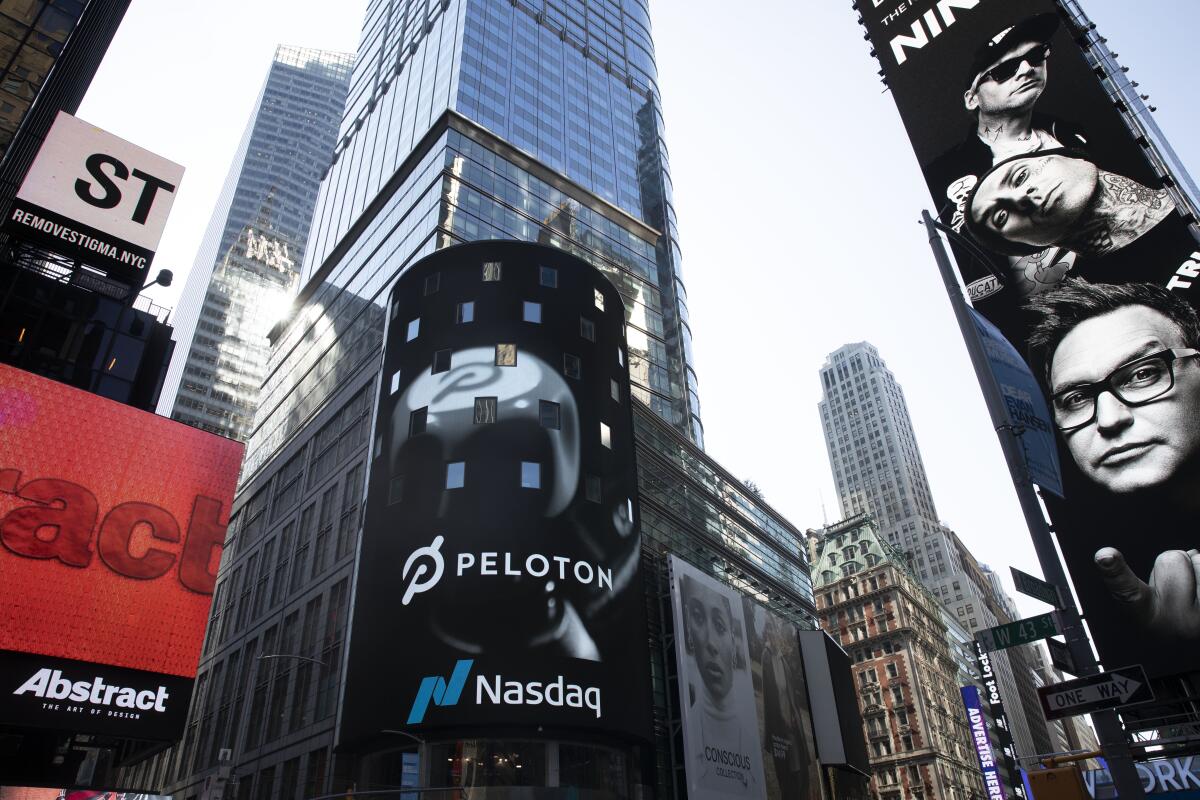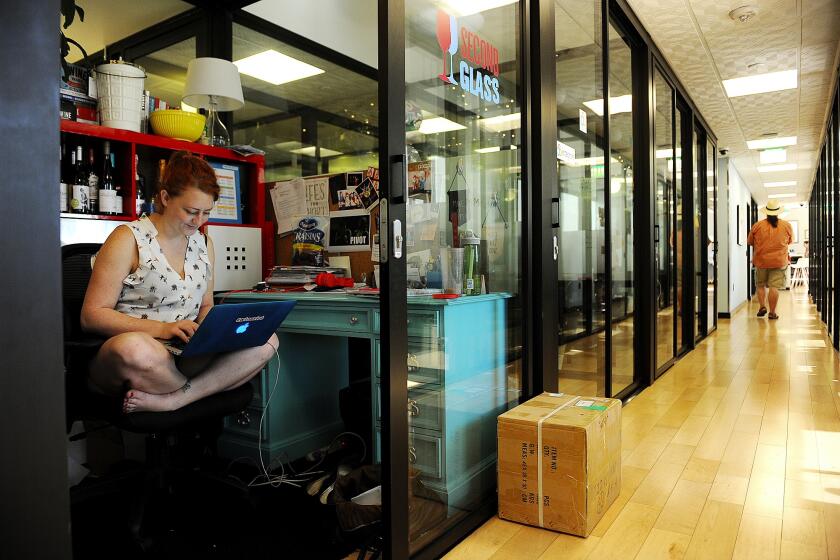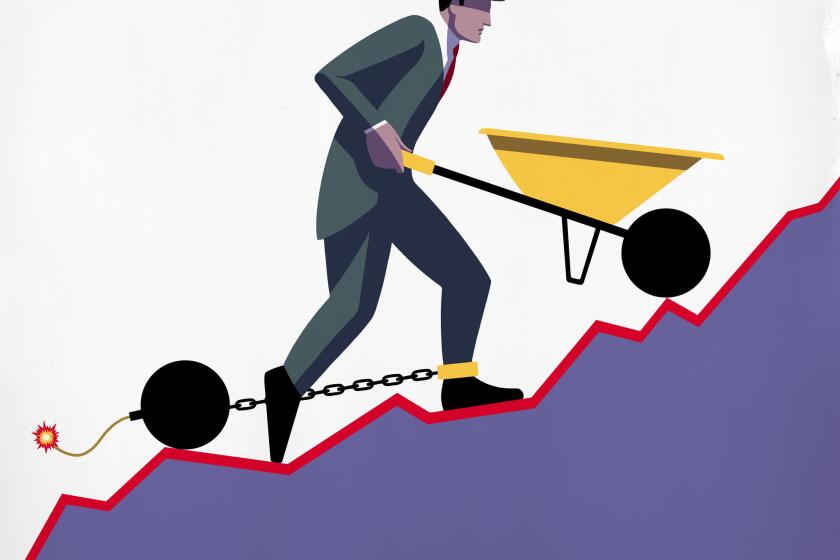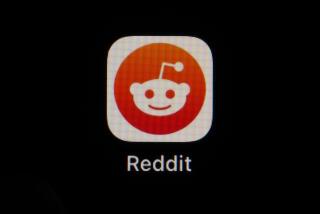IPO duds at Peloton, Endeavor give Wall Street bankers another black eye

- Share via
WeWork, Peloton, Endeavor, Poshmark and more hot start-ups just got the message: It’s not a great time to go public.
Disappointing initial public offerings and unsettled economic conditions could shut down many IPOs for the rest of the year — and maybe well into 2020, when the next batch of marquee IPO candidates like Airbnb could meet an even gloomier market and geopolitical environment.
The Hollywood agency Endeavor Group Holdings Inc. shelved its IPO on Thursday, saying unfavorable market conditions have dented investor sentiment. Poshmark Inc., an online resale marketplace for second-hand clothing, is expected to postpone its IPO into next year. Also in flux are a range of stock offerings from e-commerce companies and cybersecurity firms Palantir Technologies Inc., Postmates Inc., and McAfee Inc.
The dim outlook isn’t a total surprise given the high-profile flops this year. Fitness startup Peloton Interactive Inc. fell 11% below its IPO price on its first day of trading Thursday and extended declines by 2% on Friday. WeWork, the office-sharing company, was forced to put off its offering to next year in the face of tepid demand.
Ride-sharing giants Uber and Lyft have also traded well below their offering prices, prompting “a lot more market scrutiny” of IPOs, said Jeffrey Langbaum, a senior analyst at Bloomberg Intelligence.
For founders like WeWork’s Adam Neumann, gargantuan funding offered an opportunity — or an imperative — to double down on unproven and money-losing business models.
The trend shows a disconnect between companies’ lofty private valuations and public expectations that are skeptical of even well-known brands.
“Private valuations have been going up, but that hasn’t necessarily translated into the public IPO market,” said EquityZen research analyst Adam Augusiak-Boro.
Sharing-economy startups, especially late-stage companies, are going to have a tough time going public, said Bloomberg Intelligence analyst Mandeep Singh. The appeal of selling rather than going public will increase for companies such as Postmates, he said.
Postmates said it had submitted a confidential filing in February, but so far there is no sign the company is starting an IPO roadshow anytime soon. Its plans could slip in to 2020, people familiar with the matter said. Postmates declined to comment.
Palantir, the security company, has decided to keep on its path of raising billions in the private markets instead of a near-term IPO.
McAfee had been looking to be valued as high as $8 billion in an IPO later this fall, Bloomberg has reported. It’s unclear where its plans stand. McAfee declined to comment.
Despite the uncertainty, some IPOs on deck for the year are moving forward, but it might be because they have no choice. Madewell, the denim unit of J. Crew, is still planning to go public this year, according to a person familiar with the matter. J. Crew is distressed, and the company is under pressure to deliver returns to its credit holders. A representative for Madewell declined to comment.
Before the high-profile IPO slog this month, 2019 had been a solid one for debut offerings. With almost $17.4 billion raised, May was the biggest month for IPOs on U.S. exchanges since September 2014, when Alibaba Group Holding Ltd. raised $25 billion in its IPO. More than half of the May total was Uber’s $8.1 billion offering.
Nothing about WeWork looks normal, and Wall Street may finally be waking up
Overall, 187 IPOs on U.S. exchanges have raised $59 billion this year, including so-called greenshoe shares issued by underwriters after the initial listing.
Software and cloud computing companies have generally performed well. Crowdstrike Holdings Inc. exceeded its IPO target with a $612-million offering in June, and its shares are now up more than 50% from its offer price.
Beyond Meat Inc., which makes burgers made of chickpeas and other plant-based proteins, is the best performer of the IPO class of 2019, with its shares trading more than 500% above their offer price.
Smaller, less high-profile companies also seem able to push ahead with IPOs. Opportun Financial Corp., a financial technology company, finished trading 8% above its IPO price after raising roughly $90 million.
Still, other software companies have flopped. Slack Technologies Inc., a workplace-messaging platform provider, bypassed the IPO process with an unusual direct listing of its shares. Slack’s shares are now down about 15% since the debut.
“Companies aren’t necessarily rushing to go public,” said Alan Felder, head of private capital markets for Americas at UBS Group AG. “The private market is very healthy.”
The market flops are a reality check for banks that have long touted lofty appraisals to company founders in the hopes of being hired for their IPOs. Their incentive is clear: Public offerings of unicorns — start-ups valued privately at $1 billion or more — offer some of the fattest fees in banking, along with a chance to reward top clients and drum up trading activity. Goldman Sachs Group Inc. and JPMorgan Chase & Co. are among banks that are expected to split about $60 million in fees from helping Peloton raise $1.16 billion.
Indebted borrowers increasingly take out high-interest, adjustable-rate loans that are packaged into securities and sold to investors eager for a better rate of return.
But the high-profile misfires threaten to upset banks’ investor clients and stifle repeat business. They’ve also convinced some venture capital firms to plan more deals as direct listings, which don’t raise fresh capital and carry lower fees for the banks.
“Underwriters do misprice stocks,” said Howard Mason, a bank analyst at Renaissance Macro Research. “The risk is when you get valuations bid up to a point that is unworkable for the public markets.”
Mason said that “self corrects” for individual stocks with share-price declines, “but as you go through the correction period there’s a bunch of companies that are hung, which instead of contributing to the IPO pipeline just disappear forever.”
The price slumps may say less about the bankers’ skill than investors’ appetite for start-ups that have prioritized growth over profitability. Whatever the culprit, top IPO banks including Goldman Sachs, Morgan Stanley and JPMorgan have all stumbled on big-name deals.
Fees from equity underwriting at 12 of the biggest global investment banks dropped 12% in the first half of 2019, driven by the IPO business, according to data from Coalition Development Ltd. That was a steeper drop than from debt underwriting or merger advisory, which also posted declines.
More to Read
Inside the business of entertainment
The Wide Shot brings you news, analysis and insights on everything from streaming wars to production — and what it all means for the future.
You may occasionally receive promotional content from the Los Angeles Times.













